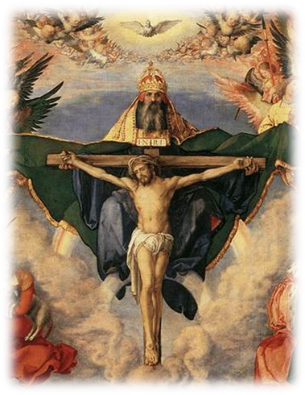What is the Liturgy? For most, it would be defined merely as the rituals and traditional practices we utilize for the sake of worship. Yet, this definition is too narrow and in fact reduces the liturgy to its lowest common denominator. This is not to say that the rubrics and guidelines of liturgical practice are unimportant or passé. On the contrary, these practices are vital to fostering a real encounter with the living God and thus demand our utmost obedience. Yet, they are not an end unto themselves; they flow from a deeper reality.
We learned that the word liturgy means “an act of the community.” But what community? It cannot simply be the community of humanity. If that was the case, then Christianity would be no different from any other religion. No…the Christian liturgy is not a creation of the human mind. It is sourced in something more. So we must ask ourselves: To what “community” does the Christian liturgy refer?
In the Gospel of John, the Apostle Phillip asks Jesus to “show him the Father.” Jesus’ response is stunning to say the least: “Whoever has seen me has seen the Father” (Jn.14:9). This is a radical assertion, not only because Jesus is claiming to be God, but also because He is claiming that God does not exist alone in His divinity. In these words, Christ is opening the door to the most intimate mystery of God’s heart: the Blessed Trinity.
At the core of Christian dogma is the belief that there is One God in Three persons: Father, Son and Holy Spirit. God Himself exists as a society of persons, three distinct individuals so completely and lovingly surrendered to one another that they are inseparable in essence. In other words, God exist as a community. The revelation of this divine Community and the incorporation of creation into this Community’s love is the mission of the Incarnation. For this reason Jesus came, to draw all things “both in the heavens and on the earth” into Himself for sake of reconciling them to the Father (cf. 2 Cor.5:18-20, Col. 1:20-21). This reconciliation is accomplished by His Passion, Death, Resurrection and Ascension.
The definition of the liturgy, therefore, is two-fold. Firstly, it is an act of the Divine Community of God, the eternal exchange of love between the Father, Son and Holy Spirit. Secondly, by merit of the Son’s being both body and soul, the liturgy is creation’s participation in this Trinitarian exchange of love through the sacramental life of the Church. Next week, we will discuss more thoroughly how the sacraments of the Church, especially the Eucharist, open us to participate in the liturgical life of the Trinity.


